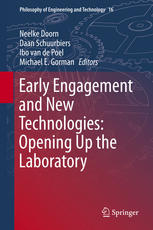

Most ebook files are in PDF format, so you can easily read them using various software such as Foxit Reader or directly on the Google Chrome browser.
Some ebook files are released by publishers in other formats such as .awz, .mobi, .epub, .fb2, etc. You may need to install specific software to read these formats on mobile/PC, such as Calibre.
Please read the tutorial at this link: https://ebookbell.com/faq
We offer FREE conversion to the popular formats you request; however, this may take some time. Therefore, right after payment, please email us, and we will try to provide the service as quickly as possible.
For some exceptional file formats or broken links (if any), please refrain from opening any disputes. Instead, email us first, and we will try to assist within a maximum of 6 hours.
EbookBell Team

0.0
0 reviewsDespite the topic’s urgency and centrality, this is the first edited volume to offer a comprehensive assessment of the varying approaches to early engagement with new technologies, including nanotechnology, synthetic biology, biotechnology and ICT. Covering five main approaches to early engagement—constructive technology assessment (CTA), value-sensitive design (VSD), midstream modulation (MM), the network approach for moral evaluation, and political technology assessment—the book will be a pivotal text in the rapidly developing research field of ELSI, which explores the ethical, legal, and social implications of new technologies.
Featuring leading scholars who discuss each early engagement approach in turn, the chapters cover both theory and applications, and include evaluative assessments of specific instances of early adoption of technologies. Further contributions focus on theoretical issues relevant to all approaches, including interdisciplinary cooperation, normativity and intervention, and political and public relevance. The publication has added profile due to the requirement of multi-billion-dollar research programs in the US and Europe to engage in ELSI research alongside that of the technical development itself, even in the early stages. Its comprehensive scrutiny of the core factors in early engagement will ensure a readership of policy makers as well as scientists and engineers.